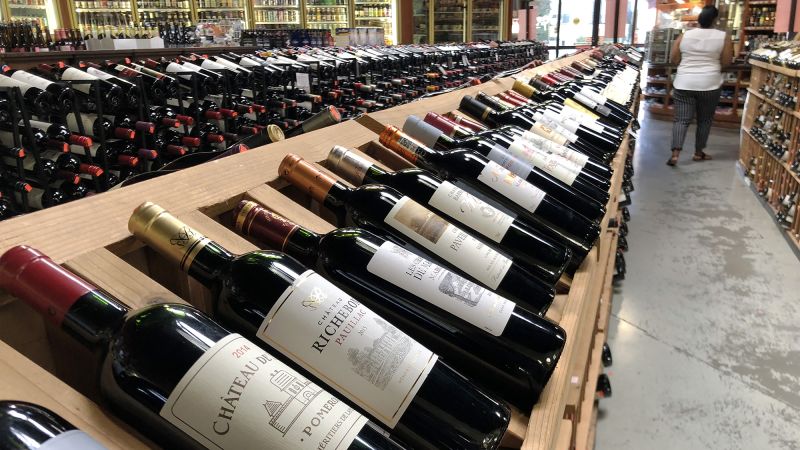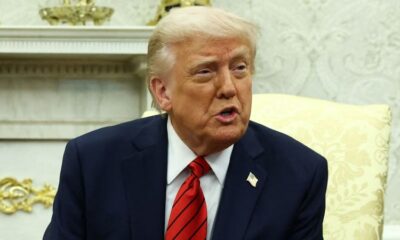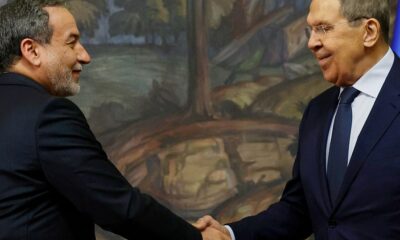CNN
—
President Donald Trump on Thursday threatened to impose a massive tariff on European alcohol in response to the European Union’s retaliation against his steel and aluminum tariffs – a tit-for-tat escalation of a trade war that could easily get out of hand.
In a post on Truth Social, Trump said his administration would impose a 200% tariff on alcoholic beverages from the EU unless it rescinds the 50% tariff the European government imposed Wednesday on US spirits.
“If this Tariff is not removed immediately, the U.S. will shortly place a 200% Tariff on all WINES, CHAMPAGNES, & ALCOHOLIC PRODUCTS COMING OUT OF FRANCE AND OTHER E.U. REPRESENTED COUNTRIES,” Trump said. “This will be great for the Wine and Champagne businesses in the U.S.”
America’s response to Europe’s response to America’s tariffs in the span of 36 hours shows how trade wars can quickly spiral out of control. After Trump’s 25% tariffs on aluminum and steel went into effect at midnight Wednesday morning, the EU immediately retaliated against what it called an “unjustified” trade action from the Trump administration.
The EU’s countermeasures included tariffs on €26 billion ($28 billion) worth of American goods, including tariffs on boats, bourbon and motorbikes. The measures, which are set to go into effect in April, are “swift and proportionate,” the EU said in a statement.
Stocks fell even deeper into the red Thursday on the trade war escalation. The S&P 500 fell into correction territory, down 10% from its all-time high that it hit just three weeks ago.
America’s spirits industry said Wednesday it was bracing for pain from the retaliatory tariffs.
Now, if the trade spat continues to escalate, US booze makers may need to contend with even more retaliation.
France is the top wine exporter to the US, shipping $2.5 billion worth of it last year, according to US Commerce Department data. Italy was a close second, sending $2.3 billion worth of wine to the US last year.
For both countries, wine is among the top goods they export to the US.
French Trade Minister Laurent Saint-Martin said on Thursday that “Trump is escalating the trade war he has chosen to start” and that his country would “fight back.”
“We will not give in to threats and will always protect our industries,” he wrote in a post on X.
Olof Gill, trade spokesperson for the EU Commission, called on the US “to immediately revoke” the steel and aluminum tariffs imposed yesterday in a Thursday briefing. “We want to negotiate, to avoid tariffs in the future,” he said. “They bring nothing but lose-lose outcomes, and we want to focus on win-win outcomes.”
Gill told CNN on Thursday that “calls are being prepared” between EU trade officials and their US counterparts.
Alcoholic beverages are one of the EU’s top exports to the US, according to data from the bloc.
France shipped almost 27 million bottles of Champagne to the US in 2023, according to industry trade association Comité Champagne. That makes America the top destination for exports of the premium beverage ahead of the United Kingdom.
Comité Champagne, which represents more than 300 Champagne houses, declined to comment, saying they defer to “our leaders in the European Union and the United States.”
The Irish Whiskey Association also said in a statement Thursday that tariffs put “jobs, investments and businesses at risk and (have) the potential to be devastating” for its industry.
“There is no winner in a trade war,” the association said, noting that the US is its biggest trading partner.
If the 200% tariffs go into effect, “it means your liquor store probably won’t stock it,” Justin Wolfers, an economics professor at the University of Michigan, told CNN. “My guess is it would drive imports of French wine to zero.”
Trump foreshadowed America’s retaliation in an Oval Office meeting Wednesday with Ireland’s Taoiseach, Micheál Martin. The president said he would respond to the EU’s retaliatory tariffs.
“Of course I will respond,” Trump said.
On Thursday, Trump called the EU “one of the most hostile and abusive taxing and tariffing authorities in the World, which was formed for the sole purpose of taking advantage of the United States.”
He called the retaliatory tariff it imposed on US bourbon “nasty.”
But the problem with retaliation is it invites more retaliation, with no easy way out and no end in sight. Trump has signaled he’s not ending his tariff plan anytime soon.
Despite growing pushback from Wall Street, Trump has threatened a wide range of additional tariffs, including reciprocal tariffs scheduled for April 2. Those looming tariffs, if they move forward, could trigger a response from the EU.
“The U.S. doesn’t have Free Trade. We have “Stupid Trade,” Trump wrote on Truth Social Thursday. “The Entire World is RIPPING US OFF!!!”
US Treasury Secretary Scott Bessent said Thursday the administration is currently targeting “strategic industries” such as steel, aluminum and “likely autos” for tariffs. “But everything else is up for grabs,” he said in a CNBC interview.
The decision to peel off any tariffs will boil down to actions US trading partners take, he added.
Meanwhile, Canada has requested consultation with the World Trade Organization (WTO) over US tariffs on steel and aluminum, the WTO said in a statement on Thursday. Canada claims the tariffs violate trade rules.
The US spirits industry called for calm Thursday.
“We want toasts not tariffs,” Chris Swonger, CEO of the Distilled Spirits Council of the United States, said in a statement on Thursday.
Swonger argued the US-EU spirits industry is the “model for fair and reciprocal trade, having zero-for-zero tariffs since 1997.”
American booze has become a frequent target of retaliatory tariffs in each of Trump’s terms. Much of US bourbon and whiskey production is located in states that voted for Trump, including Kentucky and Tennessee.
Canada, for example, recently targeted Kentucky bourbon with tariffs in retaliation for Trump’s trade actions and threats against America’s northern neighbor. A number of Canadian retailers opted to pull American-made spirits off store shelves in response to Trump’s tariffs on Canada.
Last week, Lawson Whiting, the CEO of Jack Daniel’s whiskey maker Brown-Forman, blasted the tariffs, but said the decision to pull its spirits off stores shelves hurt even more.
The EU’s 50% tariffs on American spirits are “deeply disappointing and will severely undercut the successful efforts to rebuild US spirits exports in EU countries,” Chris Swonger, CEO of the Distilled Spirits Council of the United States (DISCUS), said in a statement released Wednesday.
Whiting, speaking to Wine and Spirits Daily, said that describing the tariff situation as fluid “would be a massive understatement.” Although Brown-Forman has been planning for retaliation, Whiting said the escalation was unsurprising but nevertheless puts the company in “a tough spot.”
Meanwhile, the Unione Italiana Vini, which represents Italian winemakers, predicted Trump’s tariffs could cost the industry €1 billion ($1.1 billion).
This is a developing story and will be updated.






















